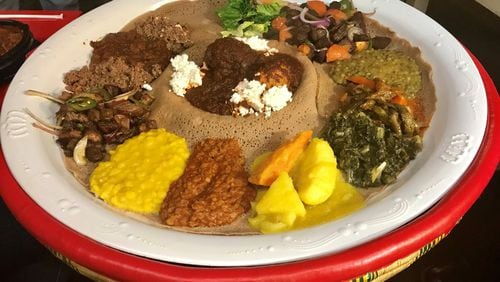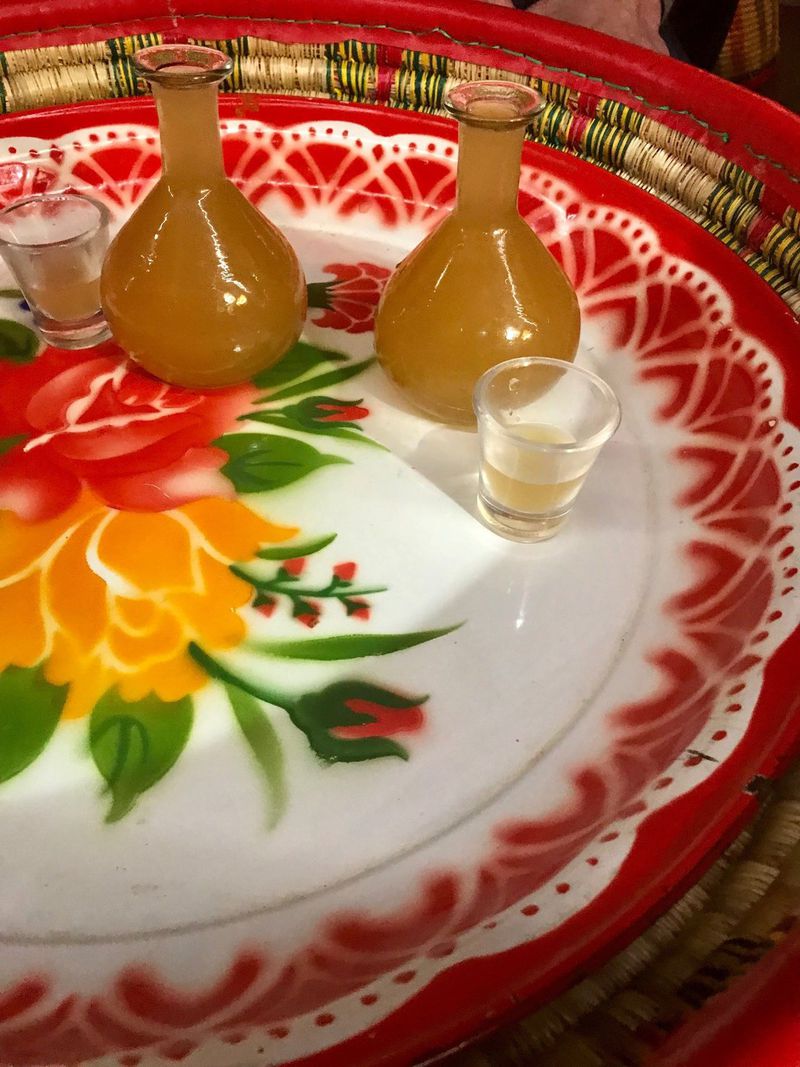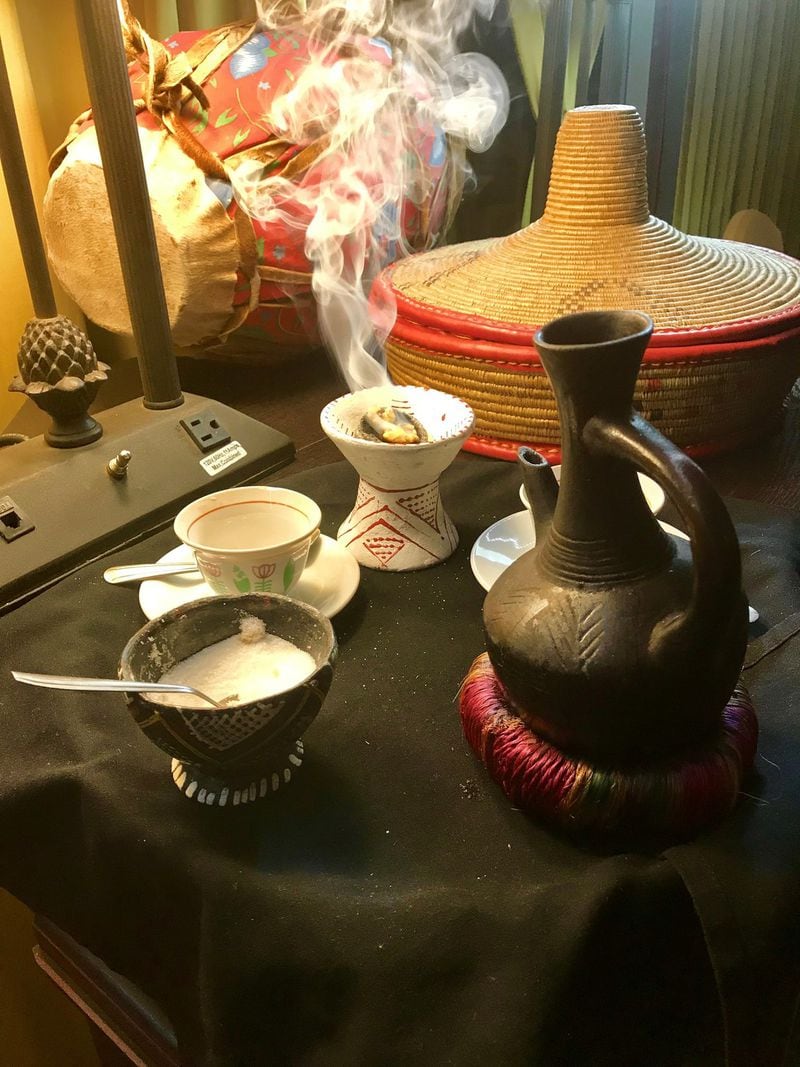Both times that I left Ghion Cultural Hall after dining there, I experienced the same feeling of satisfaction and for the exact same reasons.
First, my mouth was coated with berbere and I wanted the warm flavors of that chile-heavy spice mix to linger all night. Second, on both occasions, my dining partners were sets of friends whom I hadn’t seen in a while. After a couple of hours catching up, it seemed almost like one of those dinner parties where the conversation is engaging, the hostess is easygoing and gracious and you are so fully at home you forget the time until it’s well past midnight.
These two elements — food and the fellowship it begets — characterize Ghion Cultural Hall, and, to a greater extent, Ethiopian cuisine and the place it holds in the culture of this African nation.
To be open to what Ghion Cultural Hall offers, though, requires putting aside some negative pretenses. Like its gritty location on Cheshire Bridge Road. (Truth be told, I’m fond of this strip between La Vista and Piedmont Road. The businesses here have attitude and personality, an authenticity lacking in some newer developments in metro Atlanta.)
You’ll need to look past the worn, dated look of Ghion Cultural Hall itself. It’s a tiny place with maybe 25 seats, all of which offer a view into a tight kitchen. It’s not quite an open kitchen, being that it’s separated by clear windows, sort of like the protective ones you see at seedy gas stations. Ghion could have probably used a makeover years ago.
Look past that.
Instead, look up at the billowy cotton fabric, the patterned swaths hanging overhead like breezy sails. The effect is calming, as is the unhurried manner of your server, who will seat you and offer you a drink. It may take some time to get your beverage. You might try to order one of the five Ethiopian beers on the menu, and they might be out of it. So you try for a bottle of Ethiopian wine. They’re out of that, too, so instead you all order a round of Ghion’s Special Tej. Out comes a vial-shaped glass carafe filled with house-made honey wine. The golden stuff tastes almost like a sweetened Gose beer. You are all content once again.
To dine on Ethiopian food is to dine communally. For the full-on experience, try to get seated around one of the restaurant’s two low, round mesob basket tables that accommodate a party of four.
Double-dip haters and those who can’t stand when people eat off your plate, beware: There are no plates. Everyone eats with their hands, using spongy, sour injera bread as utensil.
The metal tray fitted inside the mesob is the perfect size for holding the Ghion Cultural Platter. It’s a celebratory spread — and a bargain at $35 since it easily feeds four — that sees rounds of injera covered with helpings of multiple lentil dishes that are neither runny nor dry, various vegetable preparations, including tender gomen (Ethiopian collard greens), a lettuce salad and ground beef (the only two items on the tray that were non-events), awaze tibs and, in the center, the star — doro wot (chicken stew).
Tibs are a cross between a stir-fry and a stew. As with most Ethiopian restaurants, here, you’ll find beef, lamb or goat tibs (Having tried the lamb and the beef, I’m a fan of the beef tibs, awaze style). They become awaze tibs when the cubed meat is cooked with awaze sauce, a blend of berbere spices, smoked paprika and lemon juice. Awaze sauce is what lingered so satisfyingly on my tongue long after dinner ended.
A word on that doro wot. My, was that chicken tender! And so deeply steeped in heady, berbere flavors and well served by the crumbles of fresh, ricotta-like ayib cheese — and an egg. Ghion Cultural Hall does a fair amount of carryout business. This is one to include on any takeout order.
Ethiopian cuisine is one in which vegans and vegetarians can participate fully. At Ghion, a veggie plate was similar to the Ghion Cultural Platter, slightly smaller and sans the meat. The plate can change up, such as one night, when the mix included suf fitfit, a bready combination of pulsed sunflower seeds and injera that looks almost like minced chicken salad. (It’s not my thing, but then again, neither is firfir, a mashup of injera and beef simmered in berbere, garlic and other spices.) There are also vegan derek tibs and the spicier vegan awaze tibs, both made with a vegan beef substitute that was surprisingly more “juicy” and tender in texture compared to the drier lamb tibs.
An Ethiopian meal isn’t really Ethiopian if you don’t drink the coffee. And the coffee service at Ghion is a ritual worth partaking in. An order of Buna coffee service – meant for two because Ethiopians don’t drink coffee alone — brings a clay pot called a jebena filled with freshly brewed coffee. Your server will light incense. The smoke will lend a ceremonial element to the whole thing, and you’ll wonder if all this fuss is for you. Yes.
You sip robust coffee from your wee demitasse cup as you lose yourself in conversation. Everyone forgets the time. You are all content.
<<Ghion Cultural Hall. 10 a.m.-3 a.m. daily. 2080 Cheshire Bridge Road NE, Atlanta. 404-320-6747, atlantaghionculturalhall.com.
Recommended dishes: Ghion Cultural Platter, doro wot, lamb wot, beef awaze tibs, Buna coffee.
About the Author









